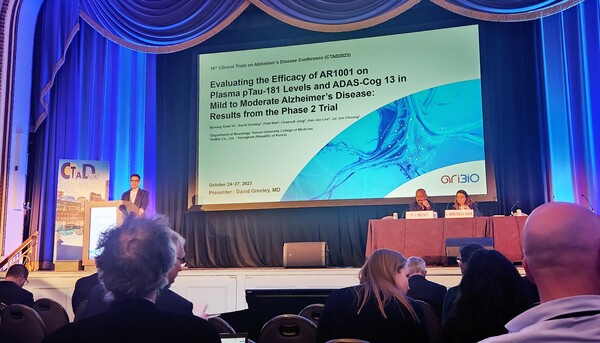AriBio said Wednesday that it has released the results of additional phase 2 analyses of AR1001, an oral treatment for Alzheimer's disease, at the 2023 Clinical Trials on Alzheimer's Disease (CTAD) in Boston, Mass. The investigational drug is being tested in a global phase 3 clinical trial.
The company said it also held a meeting of its advisory board of world-renowned experts in the field of Alzheimer's disease at CTAD 2023.

CTAD is a global organization that brings together clinicians and research leaders worldwide involved in Alzheimer's disease clinical trials to accelerate the development of effective therapies to combat the disease, AriBio said.
At the meeting, David Greeley, M.D., AriBio’s Chief Medical Officer, and Sharon Sha, M.D., a professor at Stanford University and Global Clinical Chief Investigator, presented results from phase 2 biomarker add-on analysis of AR1001, an oral treatment for Alzheimer's disease, and an update on phase 3 design and progress.
The AR1001 phase 2 add-on analysis was led by Ye Byoung-seok, M.D., a professor of neurology at Yonsei University Severance Hospital.
Professor Greeley reported that AR1001's therapeutic effects were more pronounced in patients with higher blood levels of pTau-181, one of the key factors associated with Alzheimer's disease. He added that while higher levels of pTau-181 were associated with significantly worse cognitive function over time in the placebo group, the 10 mg dose of AR1001 was associated with less deterioration than the placebo group, and the 30 mg dose reversed the pattern and improved cognitive function.
The Korean company also hosted an AriBio Social Night and an ARIBIO SAB Meeting, bringing together its global advisory board of leading experts in the field of Alzheimer's disease, research executives, and leading clinicians from clinical centers in the U.S., Korea, and elsewhere.
At the expert joint discussion, AriBio said that participants shared their expectations for the ongoing AR1001 global phase 3 (Polaris-AD), strategies for clinical acceleration, and synergies from meeting with partners in the U.S., Europe, Korea, and China.
According to AriBio, the experts agreed that multimodal strategies will be important in the future treatment of Alzheimer's disease and that combination therapies will become mainstream following the approval of Leqembi and Donanemab. They also noted that AR1001 is a safe oral treatment and has the potential to be a more widely used drug than the recently approved drugs.
Related articles
- Samjin and AriBio step up to prepare for p3 study of dementia drug
- AriBio, Shanghai Pharmaceuticals to commercialize oral dementia treatment
- AriBio gets greenlight for phase 3 study of Alzheimer’s pill
- AriBio applies for phase 3 study of Alzheimer’s pill in Europe, after US
- AriBio faces sales suspension for selling cosmetics containing banned ingredient
- Genuv secures funding from US Alzheimer's foundation ADDF
- AriBio to conduct phase 3 trial of oral Alzheimer's drug in UK
- AriBio signs ₩1 trillion deal with Chinese partner for Alzheimer's pill AR1001

